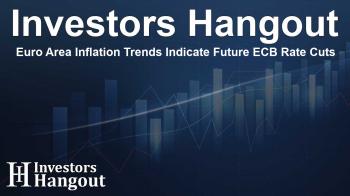Euro Area Inflation Trends Indicate Future ECB Rate Cuts

Understanding Recent Euro Area Inflation Trends
The Harmonized Index of Consumer Prices (HICP) in the euro area has illustrated an interesting dynamic, matching forecasts while revealing underlying trends. Recently reported figures show a year-over-year inflation increase of 2.44% in December, alongside a slight month-over-month rise of 0.1%. Compared to the previous month's inflation rate of 2.24%, this adjustment indicates a slight increase that has caught the attention of economists.
The Impact of Energy Prices and Consumer Behavior
One significant contributor to the inflation rate has been energy prices, a factor that traditionally plays a pivotal role in inflation dynamics. Nonetheless, analysts are not overly concerned about the implications of rising energy costs for the European Central Bank (ECB). Service prices have notably outpaced expectations, soaring by 4.0% year-over-year. However, goods prices recorded only a 0.5% increase, which fell short of anticipated figures.
Country-Level Analysis of Inflation Rates
Germany's inflation rates have been particularly noteworthy, revealing a year-over-year increase of 2.9%. The heightened inflation here is largely attributed to a surge in core inflation metrics. It is essential to note that recent changes in the calculation methods for the Consumer Price Index (CPI) have complicated the interpretation of these figures. Conversely, inflation metrics from Italy and the Netherlands did not meet expectations, leading to a balancing effect in the overall euro area inflation calculations.
Deutsche Bank's Prognosis on ECB Monetary Policy
Analysts from Deutsche Bank have offered insights into the current inflation landscape, emphasizing the ECB's broader economic policy focus, rather than concentrating solely on individual data points. Notably, while the annual services inflation has stabilized around 4%, there appears to be a noticed deceleration in the momentum of service price increases. Although domestic inflation continues to remain high, signs of moderation in wage growth offer a glimpse into potential future shifts.
Anticipated Changes in Inflation Rates
With these observations, Deutsche Bank maintains a cautiously optimistic outlook, predicting a decline in HICP inflation rates below the ECB's targeted 2% threshold as early as February. If these forecasts materialize, it opens the door for the ECB to potentially implement sub-neutral policy rates by 2025, marking a significant shift in the monetary landscape.
Policy Implications from Recent Data
The latest inflation figures have not produced any surprising negative outcomes, reinforcing the view that a measured easing of policy is the most probable scenario during the ECB's upcoming meeting in January. Economists from Deutsche Bank concluded that the prevailing conditions support this cautious stance, emphasizing a balanced approach toward future monetary decisions.
Frequently Asked Questions
What does the latest inflation data indicate for the euro area?
The recent data shows HICP inflation at 2.44%, suggesting an alignment with expectations while indicating possible moderation in future inflation rates.
How have energy prices affected the inflation rate?
Energy prices significantly contributed to the inflation rise; however, their future impact is not expected to overly concern the ECB.
What trends are visible in Germany's inflation rate?
Germany reported a higher-than-expected inflation rate of 2.9% year-over-year, influenced notably by a rise in core inflation.
What is Deutsche Bank's outlook on service inflation?
Deutsche Bank predicts that the slowdown in service price increases will lead to lower overall inflation rates in the coming months.
What policy actions might the ECB consider in the near future?
The ECB may consider cautious easing of its policy due to the recent inflation data, potentially adopting sub-neutral policy rates by 2025.
About Investors Hangout
Investors Hangout is a leading online stock forum for financial discussion and learning, offering a wide range of free tools and resources. It draws in traders of all levels, who exchange market knowledge, investigate trading tactics, and keep an eye on industry developments in real time. Featuring financial articles, stock message boards, quotes, charts, company profiles, and live news updates. Through cooperative learning and a wealth of informational resources, it helps users from novices creating their first portfolios to experts honing their techniques. Join Investors Hangout today: https://investorshangout.com/
Disclaimer: The content of this article is solely for general informational purposes only; it does not represent legal, financial, or investment advice. Investors Hangout does not offer financial advice; the author is not a licensed financial advisor. Consult a qualified advisor before making any financial or investment decisions based on this article. The author's interpretation of publicly available data shapes the opinions presented here; as a result, they should not be taken as advice to purchase, sell, or hold any securities mentioned or any other investments. The author does not guarantee the accuracy, completeness, or timeliness of any material, providing it "as is." Information and market conditions may change; past performance is not indicative of future outcomes. If any of the material offered here is inaccurate, please contact us for corrections.
